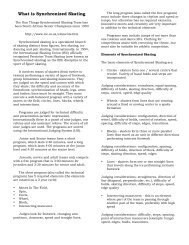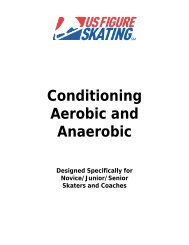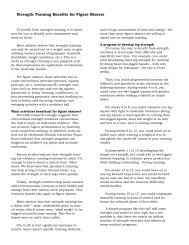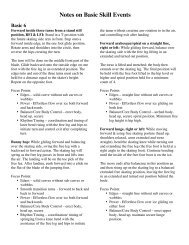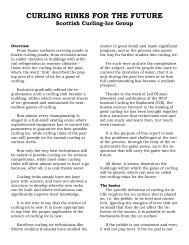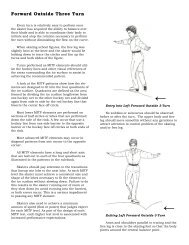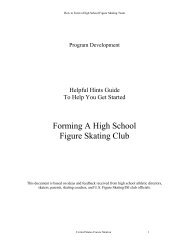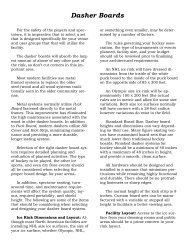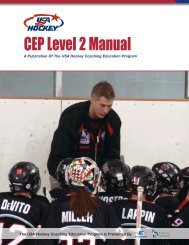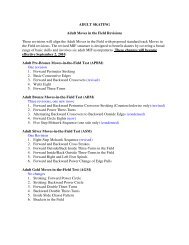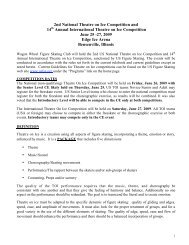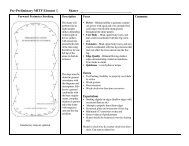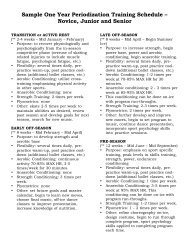CEP Level 3 Manual - Rushmore Hockey Association
CEP Level 3 Manual - Rushmore Hockey Association
CEP Level 3 Manual - Rushmore Hockey Association
Create successful ePaper yourself
Turn your PDF publications into a flip-book with our unique Google optimized e-Paper software.
T A B L E O F C O N T E N T SContinuing Education RequirementAll coaches below <strong>Level</strong> 4 shall progress through the Coaching Education Program, attending a coachingclinic at least once every three years through <strong>Level</strong> 3. After a coach has completed <strong>Level</strong> 3, the coach shall doone of the following within three years to maintain certification: attend another <strong>Level</strong> 3 clinic, take a USA<strong>Hockey</strong> Continuing Education Course (i.e. attend a High Performance Workshop, complete the online <strong>Level</strong>3 Recertification program) or attend a <strong>Level</strong> 4 clinic as per the Coaching Education Program Requirementchart. Once <strong>Level</strong> 4 is achieved, there is no further requirement for recertification.If a coach’s certification below <strong>Level</strong> 4 was received more than 3 years from the current season, the cardis rendered invalid/expired. <strong>Level</strong> 1 or 2 coaches must attend a clinic at the next level and <strong>Level</strong> 3 coachesmust choose one of the certification options in order to reactivate their status.Penalty and EnforcementAll coaches must be certified at the proper <strong>CEP</strong> level for the level of play in which he/she is coachingbeginning January 1 of the current season. It is the responsibility of the District/Affiliate to have a documentedpolicy in place regarding non-compliance. The District/Affiliate will determine what the penalty shall be to theindividual coach who fails to produce a current coaching education card with appropriate verification of level.It will be the responsibility of the local association registering the team to enforce the District/Affiliate policy.Non-compliance penalties for Junior coaches will be determined by the Junior Council.Under-Age Coaches1. Student CoachA player age 13 through 17 who is currently properly registered with USA <strong>Hockey</strong>.2. Qualifications• Must attend a training session conducted by the local hockey association.• Must always be under the supervision of a carded, screened adult coach during all practices,clinics, tryouts and in the locker room.• May help out at practices, clinics, try-outs only. (May not participate as a player in scrimmages orgames when acting as a STUDENT COACH).• May not act as a head coach or an assistant coach during practices or games.• May be on the bench during games with an adult. The STUDENT COACH will count as one of themaximum of four Team Officials allowed on the bench.• Must wear a helmet with full face shield, gloves and skates while on the ice. Must wear helmetduring games while on the bench.• May only work with players at least one full playing age level down (e.g., a Pee Wee age playermay act as a STUDENT COACH at the Squirt or Mite level).• The organization that is using the STUDENT COACH must provide a form indicating on what teamhe/she is participating as a STUDENT COACH, and, if applicable, what team he/she is properlyregistered/rostered as a player. A model form is available on the usahockey.com web site.• Upon reaching the age of 18, the STUDENT COACH must comply with the USA <strong>Hockey</strong>Screening Program and meet the USA <strong>Hockey</strong> Coaching Education Program requirements whichwill qualify him/her to act as an assistant or head coach.xiv | USA <strong>Hockey</strong> Coaching Education Program <strong>Level</strong> 3 <strong>Manual</strong>Coaching Ethics CodeAll USA <strong>Hockey</strong> coaches and instructors must abide by the USA <strong>Hockey</strong> Coaching Ethics Code, andunderstand that violations may result in full or partial forfeiture of coaching privileges in programs, at sites orevents under USA <strong>Hockey</strong>’s governance. The Ethics Code Agreement states that the coach and/or instructorhas read and will abide by USA <strong>Hockey</strong>’s Coaching Ethics Code. Ice hockey coaches and instructors needonly have to sign this commitment each hockey season. All coaches have an obligation to be familiar with USA<strong>Hockey</strong>’s Coaching Ethics Code, or as it may be amended from time to time. Lack of awareness ormisunderstanding of an ethical standard is not itself a defense to a charge of unethical conduct (See USA<strong>Hockey</strong> Coaching Ethics Code Booklet). All registered USA <strong>Hockey</strong> ice hockey coaches and instructors ofUSA <strong>Hockey</strong> programs must sign the Coaching Ethics Code Agreement in order to be eligible to coach orinstruct in any regular season activities (practices, clinics, games, tournaments, tryouts, etc.), State, District,Regional, Playoff, National Championships or in the USA <strong>Hockey</strong> Player Development Program.Coaches’ Code of Conduct1. Winning is a consideration, but not the only one, nor the most important one. Care more about thechild than winning the game. Remember players are involved in hockey for fun and enjoyment.2. Be a positive role model to your players, display emotional maturity and be alert to the physical safetyof players.3. Be generous with your praise when it is deserved, be consistent, honest, be fair and just, do notcriticize players publicly, and study to learn to be a more effective communicator and coach, anddon’t yell at players.4. Adjust to personal needs and problems of players, be a good listener, never verbally or physicallyabuse a player or official, give all players the opportunity to improve their skills, gain confidence anddevelop self-esteem, teach the basics.5. Organize practices that are fun and challenging for your players. Familiarize yourself with the rules,techniques and strategies of hockey, encourage all your players to be team players.6. Maintain an open line of communication with your players’ parents. Explain the goals and objectivesof your association.7. Be concerned with the overall development of your players. Stress good health habits and clean living.To win the game is great; to play the game is greater; to love the game is the greatest of all.Parents’ Code of Conduct1. Do not force your children to participate in sports, but support their desires to play their chosen sport.2. Children are involved in organized sports for their enjoyment. Make it fun.3. Encourage your child to play by the rules. Remember children learn best by example, so applaud thegood plays of both teams.4. Do not embarrass your child by yelling at players, coaches, or officials. By showing a positive attitudetoward the game and all of its participants, your child will benefit.5. Emphasize skill development and practices and how they benefit your young athlete. Deemphasizegames and competition in the lower age groups.6. Know and study the rules of the game, and support the officials on and off the ice. This approach willhelp in the development and support of the game. Any criticism of the officials only hurts the game.Preface | xv



